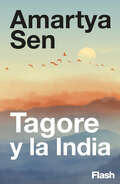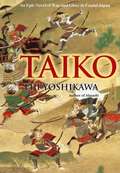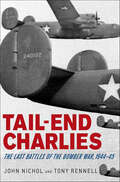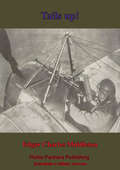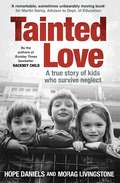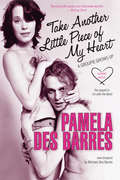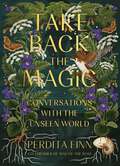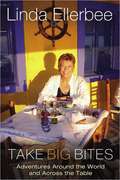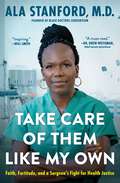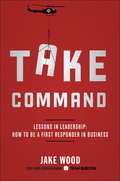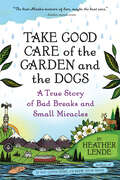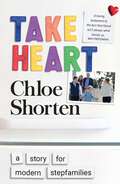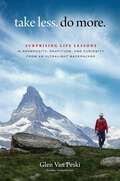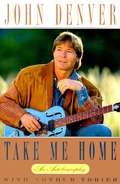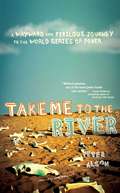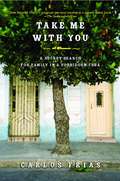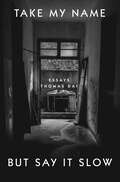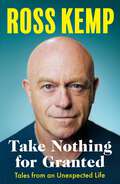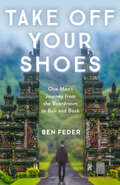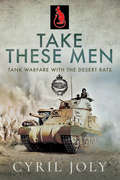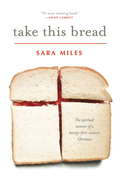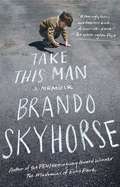- Table View
- List View
Tagore y la India
by Amartya SenUna apasionante semblanza del Premio Nobel de Literatura más desconocido. Premio Princesa de Asturias de las Ciencias Sociales 2021 Premio Nobel de Economía 1998 Existe un auténtico contraste entre la presencia intelectual de Rabindranath Tagore en la literatura, la política y la sociedad bengalíes y su imagen de gurú espiritual que llegó hasta Occidente. Entre ambas facetas se abre un amplio espacio surcado por numerosos debates en torno a la religiosidad, el sistema de castas y la independencia que llevaron a considerarlo en India una de las personalidades más polifacéticas y preeminentes del siglo XXI. Amartya Sen recorre en esta breve semblanza las piedras angulares del argumentario del pensador bengalí, un escritor de elegante prosa y mágica poesía, y redescubre a los lectores occidentales al Tagore más oculto: el concienciado activista, el pintor de enorme talento y el gran estratega político. «Rabindranath sabía que no habría podido brindarle a la India el liderazgo político que Gandhi le confirió, y nunca hubo ironía en su reconocimiento de lo que Gandhi hizo por la nación (de hecho, fue Tagore quien popularizó el tratamiento de Mahatma —alma grande— para Gandhi)».
Taiko: An Epic Novel of War and Glory in Feudal Japan (Taiko Ser.)
by Eiji Yoshikawa William Scott WilsonIn the tempestuous closing decades of the sixteenth century, the Empire of Japan writhes in chaos as the shogunate crumbles and rival warlords battle for supremacy. Warrior monks in their armed citadels block the road to the capital; castles are destroyed, villages plundered, fields put to the torch.Amid this devastation, three men dream of uniting the nation. At one extreme is the charismatic but brutal Nobunaga, whose ruthless ambition crushes all before him. At the opposite pole is the cold, deliberate Ieyasu, wise in counsel, brave in battle, mature beyond his years. But the keystone of this triumvirate is the most memorable of all, Hideyoshi, who rises from the menial post of sandal bearer to become Taiko--absolute ruler of Japan in the Emperor's name.When Nobunaga emerges from obscurity by destroying an army ten times the size of his own, he allies himself with Ieyasu, whose province is weak, but whose canniness and loyalty make him invaluable. Yet it is the scrawny, monkey-faced Hideyoshi--brash, impulsive, and utterly fearless--who becomes the unlikely savior of this ravaged land. Born the son of a farmer, he takes on the world with nothing but his bare hands and his wits, turning doubters into loyal servants, rivals into faithful friends, and enemies into allies. In all this he uses a piercing insight into human nature that unlocks castle gates, opens men's minds, and captures women's hearts. For Hideyoshi's passions are not limited to war and intrigue-his faithful wife, Nene, holds his love dear, even when she must share it; the chaste Oyu, sister of Hideyoshi's chief strategist, falls prey to his desires; and the seductive Chacha, whom he rescues from the fiery destruction of her father's castle, tempts his weakness.As recounted by Eiji Yoshikawa, author of the international best-seller Musashi, Taiko tells many stories: of the fury of Nobunaga and the fatal arrogance of the black-toothed Yoshimoto; of the pathetic downfall of the House of Takeda; how the scorned Mitsuhide betrayed his master; how once impregnable ramparts fell as their defenders died gloriously. Most of all, though, Taiko is the story of how one man transformed a nation through the force of his will and the depth of his humanity. Filled with scenes of pageantry and violence, acts of treachery and self-sacrifice, tenderness and savagery, Taiko combines the panoramic spectacle of a Kurosawa epic with a vivid evocation of feudal Japan.
Tail-End Charlies: The Last Battles of the Bomber War, 1944–45
by John Nichol Tony Rennell“A breathtakingly intimate look at the lives, loves, and deaths of the brave airmen” who flew the controversial last battles of WWII over Germany (Walter J. Boyne, bestselling author of Beyond the Wild Blue).Night after night they flew through packs of enemy fighters to drop the bombs that would demolish the Third Reich. The American and British airmen of Bomber Command were among the greatest heroes of the Second World War, defying Hitler in the darkest early days of the war and taking the battle to the German homeland when no one else would.Toward the end of the conflict, too, they continued to sacrifice their lives to shatter an enemy sworn never to surrender. Blasted out of the sky in an instant or bailing out from burning aircraft to drop helplessly into hostile hands, they would die in their tens of thousands to ensure the enemy’s defeat. Especially vulnerable were the “tail-end Charlies”—which, for the Americans, meant the last bomber in a formation, and for the British, meant a bomber’s rear-gunner who flew operations in a Plexiglas bubble.Following their groundbreaking revelations about the ordeals suffered by Allied prisoners of war in their bestselling book, The Last Escape, John Nichol and Tony Rennell tell the astonishing and deeply moving story of the controversial last battles in the skies of Germany through the eyes of the forgotten heroes who fought them.
Tails Up!
by Colonel John Buchan Edgar Charles MiddletonThe battle in the air above the trenches has held an enduring fascination for generations; the plane itself was only a new development when the First World War started and the pioneers sought to gain any advantage in the skies over their opponents. Edgar Middleton wrote copiously on the subject as well as active air service was involved with the Aeronautical Institute of Great Britain, in this book he records in sketches and anecdotes the reality of the air-war.The author was a well-respected and long-serving war correspondent of the air war for such papers and magazines as Cassell’s Magazine, Daily Chronicle, Daily Express, Evening News, Flying, New York Sun, and The Star.Author — Middleton, Edgar Charles, 1894-1939.Foreword— Colonel Buchan, John, 1875-1940.Text taken, whole and complete, from the edition published in London: Simpkin, Marshall, Hamilton, Kent, 1918Original Page Count – 314 pages
Tainted Love
by Morag Livingstone Hope DanielsIn her previous book,Hackney Child, Hope Daniels told her powerful story of survival as a child of alcoholic parents. In Tainted Love, she brings together the stories of some of the kids who lived with her in children's homes - kids who fought against the odds in their struggle to find love. We meet Robert, who tries to protect his mum from the brutal rages of his drunken father - but he's only eight and is powerless to stop the violence. There's Debbie and her sister, who are placed at the mercy of a paedophile babysitter with their mum's approval, and Abby, who shaves her head, cuts her arms, and rages against the system.These and many other true stories tells of lives fractured, endured and, in most cases, saved and turned around by social workers who fight impossible workloads to bring security and safety to children who live in chaos.
Take Another Little Piece of My Heart: A Groupie Grows Up
by Pamela Des Barres Michael Des BarresUpdated to include the escapades of the last 16 years of the "queen of the groupies," this rollicking, piquant, and sometimes heartbreaking follow-up to I'm With the Band documents Pamela Des Barres' struggles with postmodern marriage and motherhood. Covering the middle-passage years of the baby-boom generation, this biography portrays a hilarious, inspiring tussle with life's adventures and adversities, from acting with Sylvester Stallone and dancing with Bob Dylan to making ends meet by rooming with struggling celebrities and selling cosmetics. For all its famous names and insider lore, this is a survivor's story--about the anguish of coping with loved ones' addictions, suffering divorce and loss, and the joys and terrors of raising a gifted son--told with grace, charm, and a generous sense of humor.
Take Back the Magic: Conversations with the Unseen World
by Perdita FinnRenowned spiritual teacher and co-founder of The Way of the Rose Perdita Finn teaches the art and healing power of connecting with the dead, as she guides readers through the magical process of conversing with the unseen world."Finn weaves a spellbinding meditation . . . an affecting ode to the power of the unseen." —Publisher's Weekly What if you could live in a world where the guidance of those who were gone was available, right at your very fingertips? It's possible, if we are open to it. Anyone can reclaim the forgotten guidance of the dead, and anyone can return to the realm of magic and miracles. In Take Back the Magic: Conversations with the Unseen World, author, spiritual teacher, and co-founder of The Way of the Rose Perdita Finn reveals that life is beginningless, love is endless, and those who have passed don&’t truly go anywhere when they die. Weaving together memoir, history, and a non-denominational spirituality based in ecology, Finn invites readers to live the experience that the stories of our lives are much older, bigger, and more merciful than we have been led to believe.Take Back the Magic takes the reader on a journey of healing, possibility, and love, as the story of how Finn healed her relationship with her bitter, patriarchal father long after his death unfolds over the course of thirteen moving chapters. Along the way, readers will learn how they, too, can reconnect with the generous guidance of the soul&’s long story through deep time, recovering their lost relationships with their ancestors and the Earth itself. Throughout, Finn shares guidance, tips, and practical advice that will aid readers in forging their own relationships with those who have passed, as she invites every reader to reconnect with their own inner knowing and to call forth magic from the most ancient parts of humanity. An inspiring invitation to healing in this life, and to experience that we are never alone, Take Back the Magic shows that the whole world is simply souls reaching out to and finding each other—and no one is ever truly lost to us, if we allow ourselves to begin our own conversations with the unseen world.
Take Big Bites: Adventures Around the World and Across the Table
by Linda EllerbeeThe celebrated journalist, producer, and bestselling author takes us on a remarkable culinary journey through "a life lived interestingly, if not especially intelligently." Linda Ellerbee's first two books were instant classics: And So It Goes, a hilarious, unblinking look at television journalism that spent months as a bestseller; and Move On, a wry, intimate look at a woman in her time that became a milestone in autobiographical writing. Now she takes us both farther afield and closer to home in a memoir of travel, food, and personal (mis)adventure that brims with warmth, wit, uncommon honesty, inspired storytelling... and a few recipes as well. In Vietnam, preconceptions collide with the soup.... In France, lust flares with the pâté and dies with the dessert....In Bolivia, a very young missionary finds her food flavored with hypocrisy... while at the bottom of the Grand Canyon an older woman discovers gorp is good, fear is your friend, and Thai chicken tastes best when you're soaked by rain and the Colorado River. From Italy to Afghanistan, from Mexico to Massachusetts, Ellerbee leads us on a journey of revelation, humor, and heart. "What can you say about Linda Ellerbee?" Ted Koppel once wrote. "The woman is raucous and irreverent and writes like a dream." Take Big Bites proves it again.
Take Care of Them Like My Own: Faith, Fortitude, and a Surgeon's Fight for Health Justice
by Ala StanfordThe founder of the Black Doctors Consortium highlights the devastating racial injustices in our healthcare system in this inspirational memoir and empowering call to action.Dr. Ala Stanford knew she wanted to be a doctor by the time she was eight years old. But role models were few and far between in her working-class North Philly neighborhood. Her teachers were dismissive, and the realities of racism, sexism, and poverty threatened to derail her at every turn. Nevertheless, thanks to her faith, family, and the sheer strength of her will, today she is one of the vanishingly small number of Black women surgeons in America—and an unrelenting force in the fight for health justice. In Take Care of Them Like My Own, Dr. Stanford shares an unflinching account of her story, explaining how her experiences on both sides of the scalpel have informed her understanding of America&’s racial health gap, an insidious and lethal form of inequality that exacts a devastating toll on Black communities across the country, affluent and underserved alike. When Covid-19 arrived in her hometown of Philadelphia, she knew it would disproportionately affect the Black population. As the city stood idly by, unwilling or unable to protect its most vulnerable citizens, Dr. Stanford took matters into her own hands. She rented a van, made some calls, and began administering tests in church parking lots. Soon, she found herself at the helm of a powerful grassroots campaign that successfully vaccinated tens of thousands of Philadelphians. She and her movement are living proof that by drawing on faith, community, and inner strength, everyday people can affect tremendous change. Part memoir, part manifesto for health equality and justice, Take Care of Them Like My Own offers urgent lessons about the power of communities working together to take care of one another and the importance of fighting for a healthcare system that truly fulfills its promise to all Americans.
Take Command
by Jake WoodWhat do elite members of the military, first responders in the disaster zone, and high-performing leaders in fast-paced, high-pressure, modern day organizations have in common?The ability to have clarity of mind and purpose when surrounded by chaos. To operate at peak performance under risk. To be able to see clearly when others are blinded by fear, and act when others are paralyzed. To craft plans even with incomplete information, then execute those plans decisively -while still being nimble and adaptable enough to iterate as the terrain changes. To deliver in the clutch. To build teams with high impact, and then inspire those teams to follow you into the fire.In this groundbreaking book on high-stakes leadership, Co-founder and CEO of Team Rubicon and former Marine Sniper Jake Wood, shows how to apply hard-learned lessons in leadership and teamwork from the battlefield and disaster zone to your professional life. While most of our jobs don't involve leading a tour of Marines through an ambush, or rushing into a relief zone just decimated by a hurricane, in today's fast-paced, hyper-competitive business environment, we are ALL on the front lines. And in an entrepreneurially-minded world where technology is constantly reinventing how we work, global competition is fierce, and industries are being disrupted overnight, success requires a new kind of leadership. This book is about how to become the kind of leader who gets results when the stakes are at their highest--how to Take Command.
Take Good Care of the Garden and the Dogs: A True Story of Bad Breaks and Small Miracles
by Heather LendeThe Alaskan landscape—so vast, dramatic, and unbelievable—may be the reason the people in Haines, Alaska (population 2,400), so often discuss the meaning of life. Heather Lende thinks it helps make life mean more. Since her bestselling first book, If You Lived Here, I’d Know Your Name, a near-fatal bicycle accident has given Lende a few more reasons to consider matters both spiritual and temporal. Her idea of spirituality is rooted in community, and here she explores faith and forgiveness, loss and devotion—as well as raising totem poles, canning salmon, and other distinctly Alaskan adventures. Lende’s irrepressible spirit, her wry humor, and her commitment to living a life on the edge of the world resonate on every page. Like her own mother’s last wish—take good care of the garden and dogs—Lende’s writing, so honest and unadorned, deepens our understanding of what links all humanity.
Take Heart: A Story for Modern Stepfamilies
by Chloe ShortenThese days, families come in all shapes and sizes. They move from one state to create a family in another. They combine into new homes, take holidays with blends of children and parents from different households. They invent routines and rituals to establish their own rhythms. And don't forget the double sets of school uniforms and pyjamas under different roofs.Welcome to the new normal of family life for many Australians.It is a path Chloe Shorten has walked. Chloe was surprised at the lack of helpful information and unexpected tripwires for those not fitting the traditional cookie-cutter model. She was also heartened by the sensible advice she unearthed, the resilience of her children and the joy of watching her husband become a father three times over.Chloe tells of her own quest to create a new normal. Honest, sincere and warm hearted, this is a story of the modern household and explores the idea of who qualifies as 'a family' in the twenty-first century.
Take Less. Do More.: Surprising Life Lessons in Generosity, Gratitude, and Curiosity from an Ultralight Backpacker
by Glen Van PeskiIn this personal journey, ultra-light backpacker and sought-after speaker Glen Van Peski shares the life lessons he has learned through years of lightening his pack and helping others.Adventures provide the richness and texture to a life well lived. So remain open. Keep saying yes to life's opportunities. Glen Van Peski helped revolutionize backpacking by creating ultralight equipment, which allows people to take less so they can do more in the wilderness. During decades of championing ultralight backpacking, Glen became aware that &“take less, do more&” is more than just a hiking slogan. As he reduced his pack weight, he realized that the lessons learned applied to all areas of life. Now he wants to share the lessons he learned to help others live full and vibrant lives—lives characterized by purpose, meaning, and joy. In this book, you will discover transformative life lessons, which may go against the grain of popular thought but have been proven to change lives for the better. You'll learn that: Often the best strategy for achieving goals comes from subtracting rather than adding. When your first instinct is generosity, the long-term dividends will be greater than if you strive to gain your own advantage. Revising the stories you tell yourself about situations will reframe your life and increase gratitude. By investing creatively in relationships, you will generate more joy in your life. Making friends with failure will cause you to grow and improve. take less. do more. It's a revolutionary idea that will transform your life and free your soul to find your purpose—and maybe a little bit of adventure too.
Take Me Home: An Autobiography
by John Denver Arthur TobierIn a career that has spanned twenty-five years, John Denver has earned international acclaim as a singer, songwriter, actor, and environmental activist. Songs like "Take Me Home, Country Roads," "Rocky Mountain High," and "Annie's Song" have entered the canon of universal anthems, but less than three decades ago, John Denver was a young man with little more than a fine voice, a guitar, and a dream. Growing up in a conservative military family, he was not expected to drop out of college and head to Los Angeles, where the music scene was flourishing. Nor was he expected to succeed. In Take Me Home, John Denver chronicles the experiences that shaped his life, while unraveling the rich, inner journey of a shy Midwestern boy whose uneasy partnership with fame has been one of the defining forces of his first fifty years. With candor and wit, John writes about his childhood, the experience of hitting L.A. as the Sixties roared into full swing, his first breaks, his years with the Mitchell Trio, his first songwriting success with "Leaving on a Jet Plane," and finally a career that made his a global household name. He also explores his relationships with the women in his life--particularly his first wife, Annie Martell, and his second wife, Cassandra Delaney--as well as his parents, his children, his partners through his life, and his friends. Honest, insightful and rich in anecdotes that only a natural-born storyteller could tell so well, Take Me Home is a highly charged and fascinating book from beginning to end. It's like spending a couple of days with a good friend.
Take Me to the River
by Peter AlsonMEET PETER ALSON An overeducated underachiever, he's spent his postcollege decades doing his best not to grow up. Now, having just turned the incomprehensible (to him) age of fifty, and staring down his own mortality, this rambling- gambling bachelor decides it's time to settle down. After years of equivocating, he pops the question to his longtime girlfriend. A wedding date is set for just after Labor Day, and to pay for it, a plan is hatched involving poker and a trip to Vegas. Alson boards a plane bound for the neon desert on his way to the biggest game in town, the 2005 World Series of Poker. Thus begins Take Me to the River, a first-person account of one inveterate gambler and bad boy's quest to grow up while at the same time compete with more than 5,000 players vying for over $56 million in prize money during a scorching Vegas summer. Take Me to the River is a hilarious, heart-wrenching tale of Las Vegas and an exploration of what it means to be part of one of the fastest-growing and most popular sports in the United States, at the moment of its apogee, and of the lessons that poker has to teach about probability and luck, good and bad fortune, patience, perseverance, and -- most fitting for a man with marriage in his near future -- commitment.
Take Me with You
by Carlos FrasCarlos Frías, an award-winning journalist and the American-born son of Cuban exiles, grew up hearing about his parents' homeland only in parables. Their Cuba, the one they left behind four decades ago, was ethereal. It existed, for him, only in their anecdotes, and in the family that remained in Cuba -- merely ghosts on the other end of a telephone. Until Fidel Castro fell ill. Sent to Cuba by his newspaper as the country began closing to foreign journalists in August 2006, Frías begins the secret journey of a lifetime -- twelve days in the land of his parents. That experience led to this evocative, spectacular, and unforgettable memoir. Take Me With You is written through the unique eyes of a first-generation Cuban-American seeing the forbidden country of his ancestry for the first time. Take Me With You provides a fresh view of Cuba, devoid of overt political commentary, focusing instead on the gritty, tangible lives of the people living in Castro's Cuba. Frías takes in the island nation of today and attempts to reconstruct what the past was like for his parents, retracing their footsteps, searching for his roots, and discovering his history. The book creates lasting and unexpected ripples within his family on both sides of the Florida Straits -- and on the author himself.
Take My Name But Say It Slow: Essays
by Thomas DaiA luminous memoir-in-essays exploring place, identity, and what it means to grow up queer and Asian in the American South. Thomas Dai has never gone by his Chinese name, Nuocheng, fashioned from the Knoxville (Chinese: Nuokeshiweier) of his childhood and the Chengdu his mother called home. Seen another way, Nuocheng also contains the cheng of Chenggong: success. In one breath, his name speaks of a hometown, a geography, a half-baked promise to succeed. For Dai, every name is like a map, and every map can define identity. In Take My Name but Say It Slow, Dai writes of a river that runs only in the mind and a queer map housed on the internet; of love carved on the rocks of Taipei and Arizona; of pounding the racetrack in Wenzhou, watching his grandfather fade from the world. He recounts a relationship that would literally go the distance from the American Southwest to China and back again, and a road trip chasing the memory of Nabokov, the writer and lepidopterist. As he reflects on the paths his parents took to build a life in America, he also asks what it means to “return” to a place he never felt he could claim as his own. Incisive and gorgeously written, Take My Name but Say It Slow offers a fresh perspective on placelessness, yearning, and belonging, and introduces a sparkling new literary talent.
Take Nothing For Granted: Tales from an Unexpected Life
by Ross Kemp'These are the stories of some of the things that have happened to me: the funny things, the scary things, the exciting things; the things that have made me who I am. I don't want to start at the beginning and tell them in chronological order because that's not the way my brain works. And this certainly isn't going to be one of those books of life lessons . . .'I've always been passionate about finding and telling stories. And now, for the first time, here are mine.'Famous for his portrayal of TV hardman Grant Mitchell and as the maker of documentaries exploring the most dangerous people and places on the planet, BAFTA-winning Ross Kemp is one of the UK's best known TV stars. Here, Ross shares tales from his remarkable life.From his childhood in Essex, where he used to pretend the woods behind his house were the Amazon rainforest, to finding himself travelling through the real thing thirty years later, Ross's life has taken many twists and turns. Through it all there's been no plan, no roadmap, no strategy. Ross has gone from one wild adventure to the next, and never quite felt like he's fitted in anywhere.From getting lost at sea to setting a sacred island on fire, auditioning for his part on EastEnders to filming in active war zones across the world, these are the heart-warming, hilarious and hard-hitting stories of some of the unexpected adventures that have happened along the way.Warm, energetic and endlessly entertaining, it is a fascinating snapshot of a life lived to the full.
Take Nothing For Granted: Tales from an Unexpected Life
by Ross Kemp'These are the stories of some of the things that have happened to me: the funny things, the scary things, the exciting things; the things that have made me who I am. I don't want to start at the beginning and tell them in chronological order because that's not the way my brain works. And this certainly isn't going to be one of those books of life lessons . . .'I've always been passionate about finding and telling stories. And now, for the first time, here are mine.'Famous for his portrayal of TV hardman Grant Mitchell and as the maker of documentaries exploring the most dangerous people and places on the planet, BAFTA-winning Ross Kemp is one of the UK's best known TV stars. Here, Ross shares tales from his remarkable life.From his childhood in Essex, where he used to pretend the woods behind his house were the Amazon rainforest, to finding himself travelling through the real thing thirty years later, Ross's life has taken many twists and turns. Through it all there's been no plan, no roadmap, no strategy. Ross has gone from one wild adventure to the next, and never quite felt like he's fitted in anywhere.From getting lost at sea to setting a sacred island on fire, auditioning for his part on EastEnders to filming in active war zones across the world, these are the heart-warming, hilarious and hard-hitting stories of some of the unexpected adventures that have happened along the way.Warm, energetic and endlessly entertaining, it is a fascinating snapshot of a life lived to the full.
Take Off Your Shoes: One Man's Journey from the Boardroom to Bali and Back
by Ben FederA success-driven CEO goes on a year-long journey of self-discovery in Bali in this memoir about rediscovering what&’s truly important. A hard-charging CEO of a large enterprise, Ben Feder discovers that he is losing the very things that sustained him over his years of business success. Unsettled by his insight, he becomes determined to rebuild family relationships and rejuvenate his sense of purpose. Risking his career, Feder left New York with his wife and children and set off on a self-prescribed sabbatical year. That experience transforms them all. As Feder navigates the thrills and pitfalls of his time away, he draws readers into remarkable examinations of modern values and modern life. Take Off Your Shoes is Feder&’s candid and personable account of a journey across the world, and within himself.
Take Off: The humble beginnings of a Pop sensation
by Conor MaynardConor Maynard shot to fame posting cover versions of Usher, Drake and the Kings of Leon on YouTube. He soon developed a big following and he has become a huge YouTube sensation, with millions of followers. Conor's talent was quick to catch people's attention and having been spotted by international artists like Ne-Yo and Pharell Williams, he went on to record his debut album Contrast which shot straight to number one in the UK charts. Unlike many of his chart contemporaries, Conor didn't reach the charts through the X Factor, he started out making music in his bedroom and was one of the first people to find success on YouTube. In his autobiography, Conor Maynard shares his own honest, candid and often surprising take on his rapid rise to the top. The book offers exclusive behind the scenes access allowing you to get closer to the star than ever before. The book features hundreds of exclusive brand new and unseen photos and a collection of handwritten lyrics and notes.
Take Off: The humble beginnings of a Pop sensation
by Conor MaynardConor Maynard shot to fame posting cover versions of Usher, Drake and the Kings of Leon on YouTube. He soon developed a big following and he has become a huge YouTube sensation, with millions of followers. Conor's talent was quick to catch people's attention and having been spotted by international artists like Ne-Yo and Pharell Williams, he went on to record his debut album Contrast which shot straight to number one in the UK charts. Unlike many of his chart contemporaries, Conor didn't reach the charts through the X Factor, he started out making music in his bedroom and was one of the first people to find success on YouTube. In his autobiography, Conor Maynard shares his own honest, candid and often surprising take on his rapid rise to the top. The book offers exclusive behind the scenes access allowing you to get closer to the star than ever before. The book features hundreds of exclusive brand new and unseen photos and a collection of handwritten lyrics and notes.
Take These Men: Tank Warfare with the Desert Rats
by Cyril JolyA 1955 military memoir offering a first-hand account of life in the British 7th Armoured Division during World War II. Few accounts of the tank battles in the Western Desert during the Second World War have provided so vivid an evocation as Cyril Joly&’s classic account Take These Men. In such inhospitable conditions, this was armoured warfare of a particularly difficult and dangerous kind. From 1940 to 1943, battles raged back and forth as one side or the other gained the upper hand, only to lose it again. Often the obsolescent British armour was outnumbered by the Italians or outgunned by Rommel&’s Afrika Korps, and frequently it suffered from the ineptitudes of higher command. Cyril Joly&’s first-hand narrative of these campaigns—highly praised when it was originally published in 1955—tells the story through the eyes of a young officer in the 7th Armoured Division, the famous Desert Rats. It describes in accurate, graphic detail the experience of tank warfare over seventy years ago, recalling the fortitude of the tank crews and their courage in the face of sometimes overwhelming odds.
Take This Bread: A Radical Conversion
by Sara Miles"Mine is a personal story of an unexpected and terribly inconvenient Christian conversion, told by a very unlikely convert."-Sara MilesRaised as an atheist, Sara Miles lived an enthusiastically secular life as a restaurant cook and a writer. Then early one winter morning, for no earthly reason, she wandered into a church. "I was certainly not interested in becoming a Christian," she writes, "or, as I thought of it rather less politely, a religious nut." But she ate a piece of bread, took a sip of wine, and found herself radically transformed.The mysterious sacrament of communion has sustained Miles ever since, in a faith she'd scorned, in work she'd never imagined. In this astonishing story, she tells how the seeds of her conversion were sown, and what her life has been like since she took that bread. A lesbian left-wing journalist who covered revolutions around the world, Miles was not the woman her friends expected to see suddenly praising Jesus. She was certainly not the kind of person the government had in mind to run a "faith-based charity." Religion for her was not about angels or good behavior or piety; it was about real hunger, real food, and real bodies. Before long, she turned the bread she ate at communion into tons of groceries, piled on the church's altar to be given away. The first food pantry she established provided hundreds of poor, elderly, sick, deranged, and marginalized people with lifesaving food and a sense of belonging. Within a few years, the loaves had multiplied, and she and the people she served had started nearly a dozen more pantries.Take This Bread is rich with real-life Dickensian characters-church ladies, child abusers, millionaires, schizophrenics, bishops, and thieves-all blown into Miles's life by the relentless force of her newfound calling. She recounts stories about trudging through the rain in housing projects, wiping the runny nose of a psychotic man, storing a battered woman's .375 Magnum in a cookie tin. She writes about the economy of hunger and the ugly politics of food; the meaning of prayer and the physicality of faith. Here, in this achingly beautiful, passionate book, is the living communion of Christ."The most amazing book." - Anne LamottFrom the Hardcover edition.
Take This Man: A Memoir
by Brando SkyhorseFrom PEN/Hemingway award winner Brando Skyhorse comes this stunning, heartfelt memoir in the vein of The Glass Castle or The Tender Bar, the true story of a boy's turbulent childhood growing up with five stepfathers and the mother who was determined to give her son everything but the truth.When he was three years old, Brando Kelly Ulloa was abandoned by his Mexican father. His mother, Maria, dreaming of a more exciting life, saw no reason for her son to live his life as a Mexican just because he started out as one. The life of "Brando Skyhorse," the American Indian son of an incarcerated political activist, was about to begin. Through a series of letters to Paul Skyhorse Johnson, a stranger in prison for armed robbery, Maria reinvents herself and her young son as American Indians in the colorful Mexican-American neighborhood of Echo Park, California. There Brando and his mother live with his acerbic grandmother and a rotating cast of surrogate fathers. It will be over thirty years before Brando begins to untangle the truth of his own past, when a surprise discovery online leads him to his biological father at last. From an acclaimed, prize-winning novelist celebrated for his "indelible storytelling" (O, The Oprah Magazine), this extraordinary literary memoir captures a son's single-minded search for a father wherever he can find one, and is destined to become a classic.
